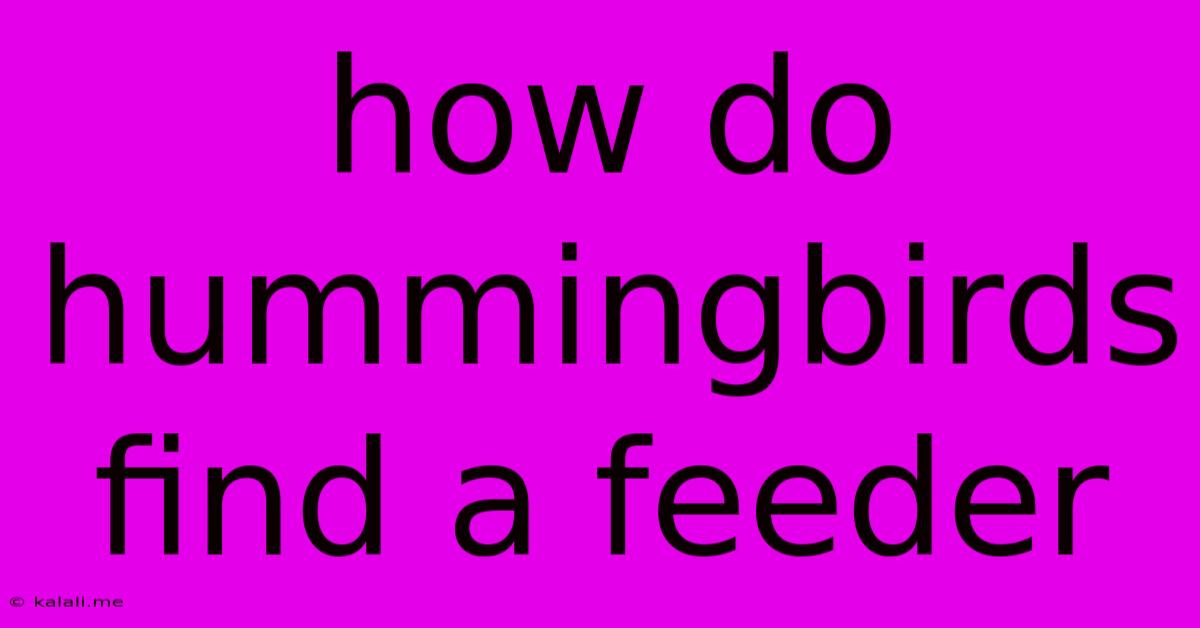How Do Hummingbirds Find A Feeder
Kalali
Jun 04, 2025 · 3 min read

Table of Contents
How Do Hummingbirds Find Your Feeder? A Guide to Attracting These Dazzling Birds
Hummingbirds, with their iridescent plumage and incredible speed, are a delight to watch. But getting these tiny dynamos to visit your backyard requires understanding their unique sensory capabilities and behaviors. This article will explore how hummingbirds locate feeders, offering tips to maximize your chances of attracting these fascinating creatures. Learn about their keen eyesight, scent detection, and reliance on established foraging routes to bring these aerial acrobats to your garden.
The Power of Vision: Hummingbirds' Exceptional Sight
Hummingbirds possess exceptional eyesight, far surpassing that of humans in certain aspects. Their vision is acutely attuned to movement and bright colors, particularly reds, pinks, and oranges. This explains why hummingbird feeders are often red – it's a powerful attractant! They can spot movement from a considerable distance, making a strategically placed feeder crucial for attracting them. Think about positioning the feeder where it's visible from various angles, avoiding dense foliage that might obscure it.
Scent: A Less Dominant Factor, But Still Relevant
While vision plays the primary role, some research suggests hummingbirds might also utilize scent to a lesser degree. The sweet nectar of the flowers they frequent likely plays a role, contributing to their overall foraging experience and memory of successful feeding locations. Although not as crucial as sight, using flower-scented oils near the feeder might provide an additional, subtle attraction.
Following Established Flight Paths and Social Cues
Hummingbirds are creatures of habit. Once they discover a reliable food source, they'll often return to it consistently. This is why establishing a feeder early in the hummingbird season is so important – you're essentially creating a new point on their established flight paths. Moreover, hummingbirds are surprisingly social creatures. They communicate with each other through subtle behaviors and may even follow each other to new feeding locations. Therefore, a successful feeder will eventually attract more hummingbirds through word-of-mouth (or rather, wing-to-wing).
Optimizing Your Feeder Placement for Hummingbird Success
- Visibility: Place the feeder in a clear, open area where it's easily visible from various angles. Avoid placing it too close to dense vegetation that might hinder their approach.
- Height: A height of approximately 3-4 feet is generally recommended. This provides sufficient clearance for their agile flight patterns and protects them from ground predators.
- Protection from the Elements: While providing shelter from heavy rain and wind isn't always possible, try to find a location relatively protected from extreme weather conditions.
- Proximity to Flowers: Placing your feeder near native flowering plants will not only attract hummingbirds with their natural food source but also ensure diverse nutritional intake.
Maintaining Your Hummingbird Feeder for Optimal Results
Regular cleaning and maintenance are vital. Spoiled nectar can attract unwanted insects and potentially harm the birds. Clean your feeder thoroughly with hot, soapy water every few days, especially during hot weather. Replace the nectar regularly, usually every 2-3 days, to ensure freshness.
By understanding how hummingbirds find their food, and by following these tips for feeder placement and maintenance, you’ll greatly increase your chances of attracting these captivating creatures to your garden. Enjoy the spectacle of these tiny, high-energy jewels in your own backyard!
Latest Posts
Latest Posts
-
What Happens If You Fly Below Sea Level
Jun 06, 2025
-
Ge Spacemaker Microwave Over The Range
Jun 06, 2025
-
How To Broaden Your Vocal Range
Jun 06, 2025
-
What Airlines Allow Pets In Cabin On International Flights
Jun 06, 2025
-
How Wide Of A Carriage Door Can You Make
Jun 06, 2025
Related Post
Thank you for visiting our website which covers about How Do Hummingbirds Find A Feeder . We hope the information provided has been useful to you. Feel free to contact us if you have any questions or need further assistance. See you next time and don't miss to bookmark.